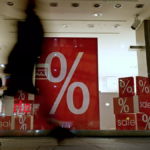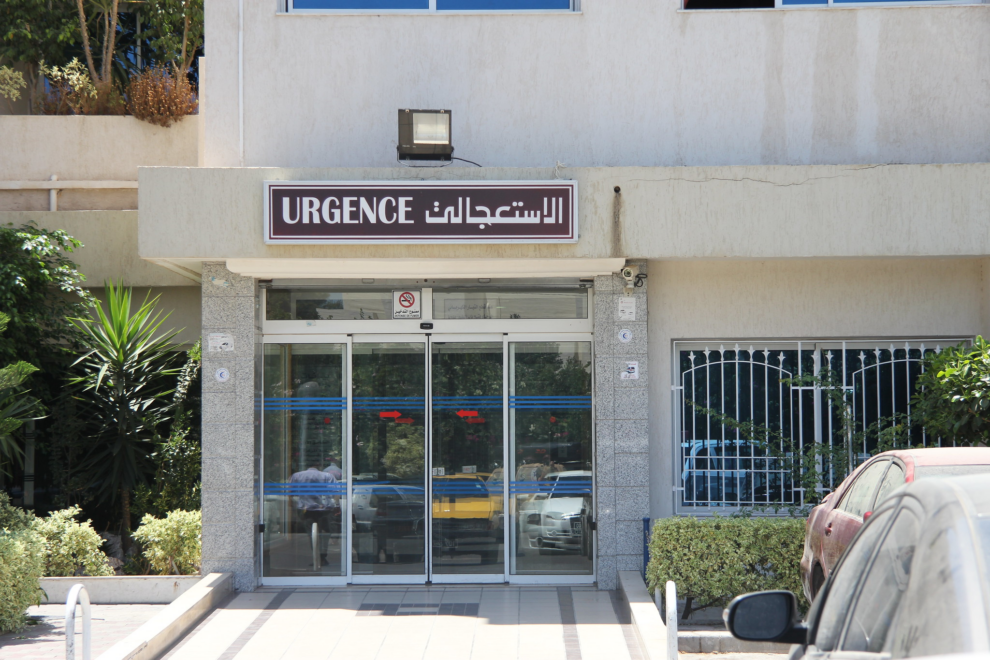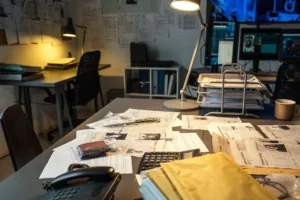Once every three months, Selwa exchanges about two hundred dinars for €50 on the Tunisian black market. With a medical prescription, she gives the money to her brother — who often travels to France — and asks him to buy medicines and bring them to Tunisia.
“Luckily, the French airport pharmacy still accepts our Tunisian prescription,” she explains. “I wonder, though, how far we have come if we, an upper-middle class family, find ourselves unable to access medical treatment.”
Selwa needs nine boxes of Tegretol 400, a common anti-epileptic, to ensure complete treatment for her sick husband. “He risks his life without this medicine, but we cannot find it here anymore,” she adds.
Epilepsy is one of the chronic illnesses that the Tunisian National Health Insurance Fund (CNAM) Selwa and his husband are part of is supposed to cover 100 percent, guaranteeing the reimbursement of the total cost of drugs.
Tegretol 400 used to be available in the neighbourhood pharmacy in downtown Sousse (northeastern Tunisia), where Selwa could ask for a refund. “However, since 2022, I have given up reimbursement because I cannot find enough boxes in the pharmacy associated with my health coverage.”
Over the past year, Selwa spent her time roaming around the city, from pharmacy to pharmacy, to collect the nine boxes. Until she was forced to look for Tegretol outside Tunisia.
Tegretol is one of many medicines no longer available in the Tunisian market. According to Naoufel Amira, president of the Private Pharmacy Owners’ Union, more than 300 medicines, particularly those used to treat chronic and rare illnesses imported from abroad, are in short supply during the current year.
“The Tunisian Central Pharmacy, managing imports, continued to get into debt with international laboratories, to the point of creating an import blockade,” a medical delegate working for the Tunisian pharmaceutical industry confirms. “There is a shortage of imported medicines, particularly those for rare and chronic diseases.”
The only solution is often to ask relatives or friends to buy them in an EU country and carry them in their suitcase. On Facebook groups of Tunisians abroad or Europeans living in Tunisia, requests for medicines are increasingly common.
“Please, I need this drug urgently for a four-year-old girl. It is out of stock here. If someone returns to Tunis in the next few days, can they bring it back?,” says a post on the Facebook group Tunisians in France, along with a prescription for a three-month course of the antibiotic Oracilline.
“These medicines shortage crises have been recurring since the end of 2016, hampering people’s right to health,” the Tunisian Economic Observatory confirms.
“Since Covid, however, the situation has continued to deteriorate. Today, we no longer have sheets on which to write medical prescriptions. We use pieces of paper that patients bring us,” testifies a doctor from the public hospital in Sousse, under anonymity, while receiving dozens of patients waiting in queues from early morning hours.
Are foreign labs leaving Tunisia?
Few in the country’s hospitals agree to talk to journalists for fear of consequences. Since September 2022, the threat of presidential decree number 54 has hung over anyone who declares a possible “rumour or fake news” that contradicts the official version.
All information must be approved by the ministry of health, which reports directly to the Tunisian president.
Tunisian president Kais Saied dismissed the previous director of the Tunisian Central Pharmacy in January 2022, replacing him in September 2023 after nine months of vacuum. Since then, little information has been filtered from the public authority in charge of managing the import of medicines.
In Tunisia, 46 percent of medicines come from abroad, while the rest are produced inside the country. 76 percent of hospital medicines come from imports.
“There is a difference between available products and available molecules. Many molecules are present with locally-produced generics, but patients often lack confidence,” the medical delegate of a private laboratory explains.
Selwa tried buying the generic medicine for epilepsy [carbamazepine, nrdl], “but it did not work on my husband.” “Is being able to choose the best medicine for a chronically ill person too much to ask?,” she wonders. In any case, most of the equipment and raw materials used for generics are still imported from abroad in foreign currency.
Several foreign laboratories are represented in Tunisia, such as the French Sanofi, the US Pfizer, and the Italian AlphaSigma. “But their products that are not entirely made here must pass through the Tunisian Central Pharmacy, which is not assuring payments,” the medical delegate explains.
“This is why many foreign labs are leaving Tunisia, as the Swiss Novartis did. When a medical laboratory is present in a country, importing into the local market makes economic sense. If it leaves, much less so. This is why fewer and fewer medicines will be available,” he adds.
In Tunisia, the Tunisian Central Pharmacy manages the import medicines circuit — but is too indebted to pay foreign suppliers in foreign currency. According to a recent interview with Tunisian media of Amira, president of the pharmacies union, the debt is estimated at one billion dinars (about €300m) in 2023.
“The state has been covering the Central Pharmacy budget deficit in recent years but is no longer doing so because of the worsening financial crisis,” he added. Thus, the import circuit is now compromised.
As a result, patients exchange medicines or advice on how to find them here in front of the hospital. “The lack of medicines also opens the door to the black market,” the doctor from the public hospital in Sousse says.
‘The same medicine could cost more here than in Europe’
The international context has undoubtedly not helped Tunisia. Rising energy and raw materials prices following the war in Ukraine also led to medicines shortages in some European countries — paracetamol and amoxicillin in France, for instance.
But in Tunisia, the global drug production chain crisis coincides with a vast post-Covid financial crisis.
After rejecting an IMF agreement, the leading international rating agencies have downgraded the country twice in the last two years (from CCC+ to CCC-). Tunisia is dangerously sliding towards those countries considered at risk of default.
The medicines join a long list of basic necessities — flour, sugar, fuel, milk, coffee, rice, and other goods — that have been periodically in stock shortage since 2022.
“The recent devaluation of the dinar has increased the amount that the Tunisian Central Pharmacy has to pay to buy the same medicines in foreign currency, although PCT continues to sell them at the same prices as before in Tunisia, to ensure that medicines are affordable,” the Tunisian Observatory of the Economy explains.
“Take the example of Flecaine, a product against arrhythmia. The batch this summer cost 1,500 dinars,” they said. Two months later, the private laboratory medical delegate confirmed that it reached 1,800 just because of the exchange rate increase.
“Moreover, niche products such as Flecaine are used by very few patients, so the Central Pharmacy will not mobilise its already very scarce funds to import it, and ill people will no longer find it at the hospital or pharmacy,” the observatory also said.
According to this sector expert, competition between private laboratories inside Tunisia often leads to overproduction of the same medical product while others are missing. “We produce what is profitable, not what is lacking,” the medical delegate admits.
“In Tunisia, the selling price of medicines is fully-liberalised, whereas in France, for instance, it is not. Thus, the same medicine could cost more here than in Europe. A box of 30 of Aprexevo for the treatment of hypertension is sold in France for €7 and reimbursed at 60 percent. Here you find Aprovasc (the same kind of medicine from the same laboratory) for 62 dinars, more than €20,” he said.
While wholesalers’ selling prices are not regulated, the Central Pharmacy, depending on funds from the public coffers, finds itself paying the difference between the price of laboratories and the selling price, ending up with even more debt.
Private clinics, thus, no longer go through the Central Pharmacy, an obligatory step for public hospitals. “If we need an imported medicine, the Central Pharmacy asks us to pay in advance, and then we often do not receive the lot, or we lose those funds,” explains Lina, head of the purchasing department at a private clinic in Tunis.
Migration also contributes to health system’s failure
These factors strongly impact the Tunisian national health system, which is imploding. It is in this context that Brussels signed an agreement with Tunisia valued at €785m to tackle the migration issue in July 2023. But by now, migration also has to do with the health system’s failure.
“There are many elderly Tunisians, cancer patients, or chronically ill people among migrants,” says a volunteer of the NGO AlarmPhone from the Italian island of Lampedusa, where the boats arrive daily from Tunisia. “During the summer of 2023, a man arrived clutching an X-ray as if it were the most important document he had.”
While the EU focuses on border-control equipment and funding to stop departures, much of Tunisia’s public services — starting with healthcare — are imploding due to a lack of financing.
“In the last 10 years, the budget of the ministry of the interior has grown significantly, more than the budget for social security, health, public transport or education,” writes researcher Mohamed Haddad in his report on the mapping of Tunisian public debt, published by Germany’s Heinrich Böll Stiftung.
In front of the public hospital of Sousse, many patients come from the inland regions of the country, hundreds of kilometres from this coastal city, one of the four in Tunisia with a cancer ward. “I have been coming back for weeks hoping to find a chemotherapy medication, but there is none,” explains a young man accompanying an elderly man in a wheelchair.
“We often prescribe a medicine, and patients return to tell us they have not found it, looking for an alternative,” explains the doctor. “Sometimes they don’t believe us out of desperation. And we are forced to send them home and ask them to return if they have found the medicine themselves,” concludes the Sousse hospital doctor.
Often, however, the alternative does not exist.
Source : EUOBSERVER

















Add Comment